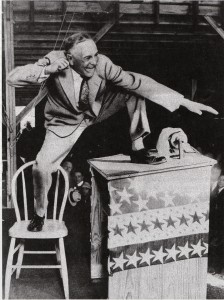Billy Sunday was a professional baseball player who became an evangelist in the early part of the twentieth century. He toured around the U.S., drawing big crowds wherever he preached. His style of preaching was very physical, befitting a former athlete—he would jump up on tables, chairs, or the podium; run back and forth across the stage; and even sometimes smash furniture to emphasize his point.

Billy Sunday, from thegospelcoalition.org
It was big news for a community when Sunday brought his evangelical team to town. Early in 1918, he announced a six-week visit to Duluth starting that May. Sunday expected any community he visited, especially the churches in that community, to form a planning committee and take responsibility for some duties. One local responsibility was to raise money to cover expenses. It was determined that Duluth needed to raise $45,000. The largest portion of that money went to the building of a tabernacle.
Ever since Sunday’s large tent had collapsed under the weight of a snowstorm in 1906 in Colorado, he required the communities he visited to build a large, one-story building where he could hold his worship services. He called the building his tabernacle.
The city agreed to have Duluth’s tabernacle built on a site on the west side of Fourth Avenue West, between First and Second Streets, on a green space called Courthouse Square. That’s the present-day site of the Duluth City Hall, which was built eleven years later in 1929.

From the Duluth Herald May 2, 1918
The Duluth Herald at the time published a floor plan of the building, which would measure 224 feet by 183 feet and would be equipped with electric lighting, plumbing, and heating. It would have 4,500 seats for the public, 1,000 seats for the choir, and standing room for 1,500 to 2,000 more people. To make the tabernacle level, since it was being constructed on a slope, the First Street end, at 42 feet high, would be taller than the Second Street end, at 21 feet.
Ground for the tabernacle was broken on April 20, 1918, and workers immediately began laying timbers for the foundation. The building was completed in three weeks, on May 11. Billy Sunday arrived in Duluth on May 25, and the next day he preached three sermons in the tabernacle. A total of 18,000 people attended those first three sermons.
After Sunday left town in July, the tabernacle was purchased by a local contractor to be taken down. The contractor planned to use the lumber to build houses in West Duluth.